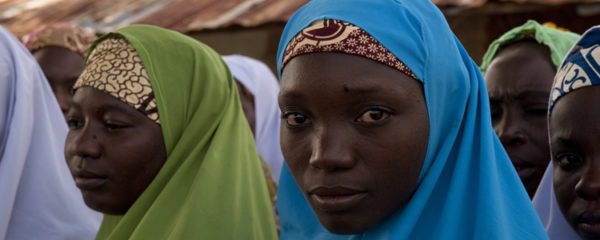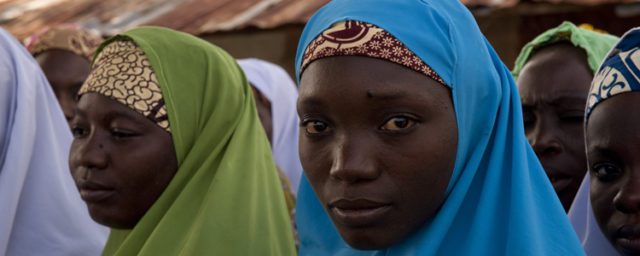Economic Issues
Bridging The Gap Between The Rich And The Poor In Nigeria -By Bamidele Williams


Women of Takalafiya-Lapai village (Niger State) are beneficiaries of Nigeria’s Fadama II project. Photo: Arne Hoel / World Bank
“2% of Nigerians own 90% bank deposits”
As a major indicator of wealth distribution in Nigeria across income groups, a mere two per cent of Nigerians own 90 per cent of total deposits in Nigerian banks.
This represents the wide gap between the rich and the poor in Nigeria, which continues to pose major socio-economic development challenges to the nation.
Director of Research and International Relations at the Nigeria Deposit Insurance Corporation, NDIC, Alhaji Mohammed Umar, disclosed this at the Businessday Capital Market Development Annual Conference in Abuja.
His words: “Our current deposit insurance coverage is N500, 000 for the Deposit Money Banks. And some people have said that it is low. I can tell you that it is very adequate for the majority of accounts.
“It will interest you to know that it covers over 90 per cent of accounts in the country. Indeed, Nigerians who have more than N500, 000 in their accounts are just two per cent.
Emefiele CBN Governor
“What we found is that this two per cent Nigerians have 90 per cent of banks’ total deposits. Look at that – two per cent Nigerians own 90 per cent of total banks deposits, while the remaining 98 per cent have just 10 per cent of total deposits. What that tells you is that the gap between the rich and the poor has continued in this country.”
Alhaji Umar added that there were about 70 million bank account holders in the country.
The total bank deposits stood at N17.2 trillion, as at December 2015, according to a post on the Central Bank of Nigeria, CBN, website.
Earlier in his address, the Director-General of the Securities and Exchange Commission, SEC, Mr. Mounir Gwarzo, urged Pension Fund Administrators, PFAs, to invest more in the nation’s capital market, with a view to deepening it and ensuring better returns on contributor’s funds.
He said: “Deepening Nigeria’s Capital Market through Maximum Utilization of Pension Funds is a conversation our country must continue to have in order to ensure that the impressive pool of savings we have been able to mobilize over the last decade is put to productive use for inclusive economic growth.
Even the environment has been segregated between classes of Nigerian populace. While the well-to-do live comfortably at GRAs with full services of water and power supplies, the less privileged dwell in ghetto areas under disgusting unhiegenic condition with no safe drinking water or light to illuminate their bedrooms at night.
What Nigeria needs to address all these problems is lack of good governance.
People who are pious, just, patriotic and trustworthy should lead the affairs of the country. Our current leaders only attend organised symposia and fora annually to deliver lengthy lectures on the virtues and good leadership qualities of our past national heroes without having an iota of wish to be like them in terms of simplicity, morality, love for the country and the common people, true observance of the rule of law and due process, judicious use of national resources for the overall benefit of the citizenry and lack of greed and avarice.
No time in history has the country become so stupendously rich and its people so magnanimously poor. People of other oil producing countries enjoy the benefits accrued from any slight hike in the price of oil at world market, while Nigerians pay dearly for epileptic services of government parastatals. One could recall a time during the previous administration when Kuwaitis were individually given S500 each as a gift by their government due to hike of the oil price in global market, while back home here our government was increasing domestic prices of petroleum products for the seventh time and maybe for the same reason.
If not for the technological advancement that constricts the world into a global village and so information about any country becomes rapidly available at the click of a button, foreigners living outside the shores of the country wouldn’t believe the fact that most Nigerians are living below poverty line. Identifiable factors serving as a hindrance to Nigerians’ economic progress include corruption, nepotism, political godfatherism, brutal system of capitalism and government’s insensitivity to the woes of the people.
To alleviate the harsh economic hardship of Nigerians, government should sincerely and seriously enforce its policy of zero tolerance on corruption paving the way to legal prosecution of corrupt officials no matter how highly placed. Unless government turns blind eyes in dealing with its corrupt officials, corruption as the bane of progress will continue to persist.
“How can you thank a man for giving you what’s already yours? How then can you thank him for giving you only part of what is yours?” Malcolm X
“If you can, help others; if you cannot do that, at least do not harm them.” Dalai Lama
The Nigeria body polity went through an “interregnum” of military dictatorship for upwards of fifteen years. During the time, democratic institutions and practices were suspended. The effect of the long years of military rule was catastrophic. Hence, the return to democratic rule in April 1999, though epochal, was suspect. One of the major sources of anxiety was when the polity became inundated with “old hands”; new-breed politicians that were mainly the forebears of the “old hands,” as well as former military-gladiators-turned-civilian politicians. It is this phenomenon of “recycling” that my articles interrogates and juxtaposes with certain characters in advanced democracies with a view to evaluating the country’s democratic consolidation and improving the standard of living of its people.
The present system of government in Nigeria, our mode of Federalism is a sieve with lots of holes that favours the permeability of looters to be looting and capitalists to keep extorting the common man.
We need restructuring.
Restructuring of governmental policies and its enforcement. Our government has failed the common man. See the statistics.
With this present sect of government and their policies, the poorer will continue getting poorer and the rich will continue getting richer with the common men continuing to groan under the escalating hardship and wallowing in self pity.
This is not a pessimistic tone as I’m very optimistic there is light at the end of the tunnel. It is only the bitter and brutal fact.
The good news is that the end of the tunnel is now— the light is here.
The present generation of Nigerian youths is the light.
They owns the key to unlocking that very gate that leads to that very realm of “good governance” (Google search Bamidele Williams on good governance, to fully understand my concept of good governance).
(Also Google search, “Bamidele Williams on youth as the panacea” )
Now is the much awaited time. Now is the time for the conscious youths and the politically-inclined in the country to come to the rescue mission of the largest black man, and victory is certain.
Victoria ascerta.
I’VE SEEN THE LIGHT…
I MUST ILLUMINATE THE DARKNESS IN THE COUNTRY
Bamidele Williams
13/06/2016
08134810254
profcube10@gmail.com
A public affairs Analyst and Convener, OAU pigeonpost.



















